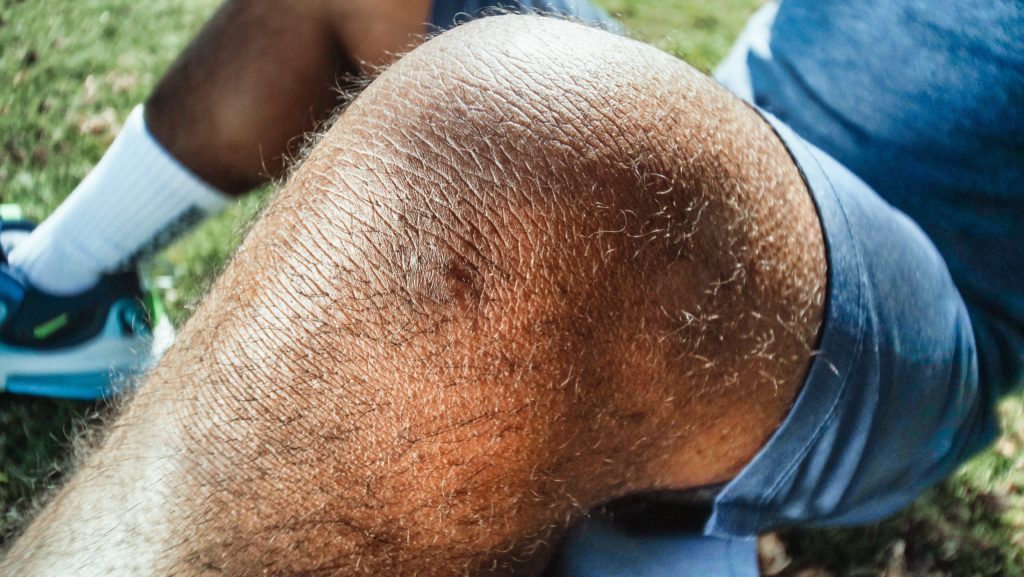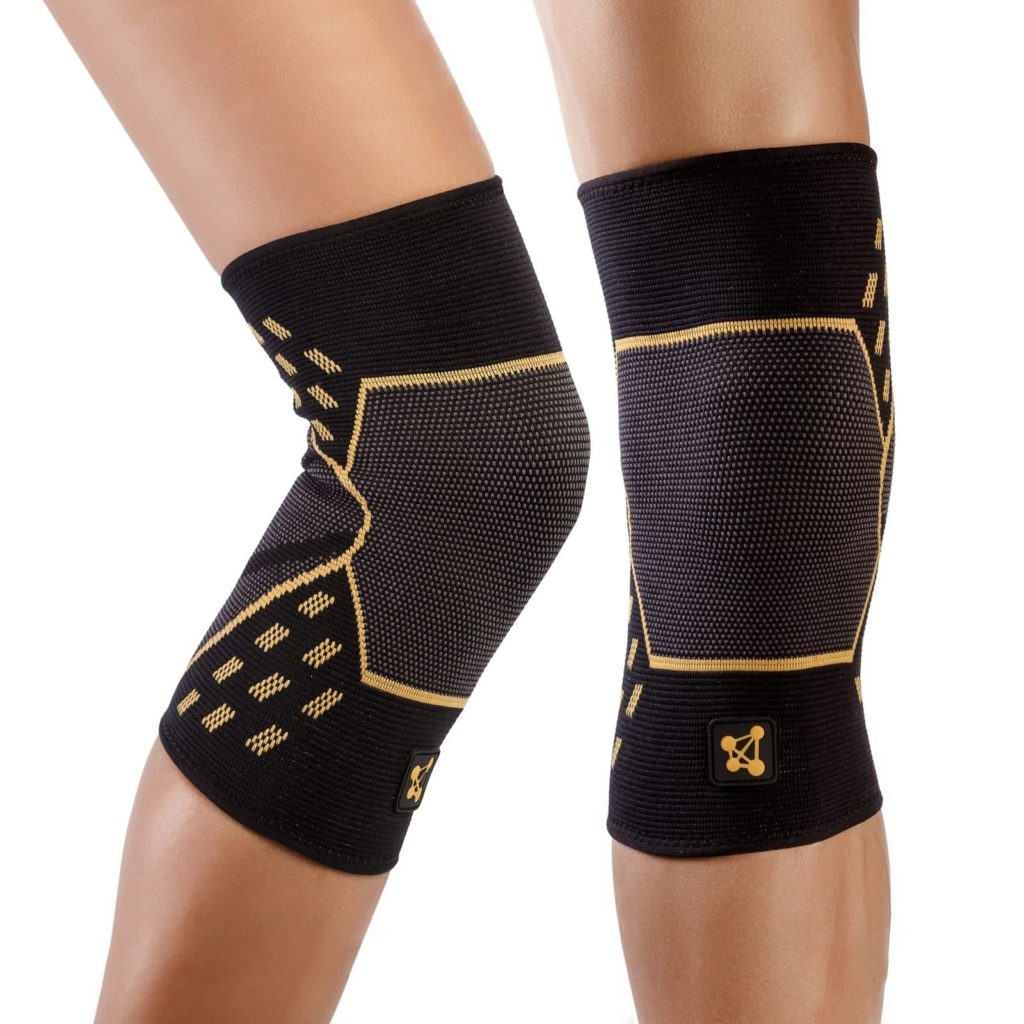
As we think about our normal movements throughout the day, we start to realize our knees are a big part of most every move we make. Even when we’re moving our upper bodies only, our knees still act as shock absorbers for the rest of our body. And if you think about it, even at rest our knees are likely to be activated somewhat (whether bent in a seated position, or snuggled up on our sides as we sleep). Our knees are constantly experiencing stress and strain just through the normal activities of life. Add onto that things like exercise, sports and other work or leisure activities, and it’s no wonder knee pain and injuries are common. You may be wondering how to keep your knees healthy but maybe you don’t know where to start, or even which questions you should ask to help keep your knees in tip top shape. Look no further – our Knee Health FAQs guide is a list of some of the most frequently asked questions about knee health in one handy guide for quick and easy access.
Why does my knee hurt?
The biggest joint in our body, the knee, can become painful for a variety of reasons. Discomfort can arise from overuse, such as going for a long run without properly building up to that llong of a distance or using improper gear, such as running with uncushioned shoes (or barefoot). Pain can stem from an injury such as twisting or hyperextending the joint during activity, sports or exercise. Injury can be caused from using improper form during weight lifting or other exercise (such as squatting and allowing knees to come too far forward). As you will learn in our Knee Health FAQs guide, even inflammation from a poor diet or allergies can trigger painful swelling in the knees.
Knees can also feel anything from mild discomfort to excruciating pain from the cartilage breakdown of arthritis. When the cushioning cartilage between the bones in the knee joint deteriorates due to old age, extreme overuse or genetic predisposition to arthritis, the bones grind against each other.
How do you get rid of knee pain fast?
The important thing to remember when relieving knee pain is that you want to be conscious of the level of pain and to be wary of causing more damage. Pain relievers do a great job of masking the issue, but can also result in the individual moving in ways that cause more injury (since they can’t feel the pain).
But for quick relief, there are many over the counter oral medications, ointments and rubs, and supplements that can be used. Knee compression sleeves or braces can also help with pain relief and healing.
What is the best ointment or medication for knee pain?

The first mode of treatment for knee pain may be an easy fix. Over the counter medication or ointment, in conjunction with ice therapy can sometimes be all it takes to reduce inflammation and restore the knee to healthy function. Acetaminophen (better known as Tylenol), ibuprofen (Advil), NSAIDs (aspirin) and naproxen (Aleve) all contain anti-inflammatory properties in addition to pain relievers to help reduce swelling (aiding in healing) as well as relieving discomfort. While pain medication definitely can offer big relief from knee pain, the individual should be careful not to overuse the medication as long term use can contribute to liver damage, as well as, if the knee injury is severe, mask the underlying issue and the individual could experience more joint damage.
Glucosamine and chondroitin are two supplements that have shown some efficacy in relieving knee discomfort for some individuals. These can be used in conjunction with both OTC pain relievers and topical pain relieving ointments.
Topical treatments (some popular brand names include Icy Hot, doTERRA Deep Blue Rub and Biofreeze) can provide fast, although temporary relief, of knee joint pain. Generally, these ointments and rubs won’t get to the root of the problem but can certainly make movement more tolerable until the injury or pain recovers.
Knee Health FAQs – What exercises should I avoid when my knees hurt?
The double-edged sword of this question is….it depends. Depending on the injury, you could be better off moving (as a moving joint stays more lubricated and therefore continues to move better) or if the injury is severe, total rest may be in order.
At the onset of knee pain, if you haven’t discussed with a medical professional, the best course of action is to rest, reduce weighted movement (ie exercise, lifting weights, etc) briefly to see if pain subsides after a day or two. Then, slowly work your way back into exercises like squats and lunges – if they can be performed without pain, then continue to monitor yourself as you exercise.
If knee pain gets in the way of some compound exercises like squats and lunges, try doing other leg exercises where you isolate muscles (like leg curls or extensions) – if they don’t cause pain, use those as a strength training option until pain subsides, or until you’ve conferred with a doctor or physical therapist. Medical professionals will be able to give you more information on what exercises are safe to do, and which can be done even if there is mild pain.
Sometimes working through pain is ok (if the doctor indicates!) but often, it should definitely be avoided until you’ve healed up.
Knee Health FAQs – What is arthritis?
Simply put, arthritis is a catchall name to describe a condition where joints become inflamed, swollen and painful. There can be several causes, including genetics (rheumatoid), overuse, or age. Arthritis actually can refer to any one of over 100 diseases, conditions, etc.
Knee Health FAQs – What does a compression sleeve do for your knee?

Compression sleeves, knee sleeves, braces, and wraps all refer to medical equipment that can help your knees in a couple different ways. So how do compression sleeves work? First, a compression garment works to provide support to the joint, immobilizing it a bit. It provides pressure around the affected joint, which both helps alleviate swelling and reduce pain. The pressure can also improve blood flow to help speed up healing.
Is it OK to wear a compression sleeve all day?
Can you wear a compression sleeve on your knee all day? Yes, it won’t cause any issues…but the real question is ‘should you?’ The answer to that according to many health professionals is a resounding ‘no’. Wearing a knee compression sleeve all day does not provide any measurable benefit to either pain relief or swelling. The best time to wear compression garments is when exercising, with heavy movement, or when the pain/swelling is uncomfortable. Experts recommend though, removing the garment when resting, sleeping or when pain and swelling is under control.
The caveat to this is if your orthopedic surgeon or doctor recommends around the clock wear of a knee sleeve – always follow doctor orders!
Are compression sleeves good for knee pain?
Compression sleeves and braces absolutely can help relieve pain as well as injury healing or prevention. For knees and other joints that have been injured, wearing a compression garment can help the joint heal and after it’s healed, can help provide support to avoid reinjury.
Knee compression sleeves work very well for providing comforting pressure around an injury, helping improve blood flow which can reduce pain, as well as aid in reducing swelling which also helps reduce pain.
Is a compression sleeve good for a meniscus tear?
Actually, yes – a compression sleeve can not only help relieve pain and swelling but can also help heal a meniscus tear. This common injury does not always require surgical repair – the meniscus can heal on it’s on with proper self-care. Rest is an important factor in the meniscus repairing itself, and wearing a compression sleeve around the knee can provide support and stability during necessary movement throughout the day.
How tight should a knee sleeve be?
A knee compression sleeve needs to be quite snug to provide the desired benefits, however, too tight and you risk impeding movement and blood flow. A good quality knee sleeve will have various sizes to choose from so you can start by making sure you select the proper size (and if you’re in between sizes the general recommendation is to size down since the sleeve will stretch out a bit).
If you lose sensation in your toes when wearing a knee sleeve it’s too tight. And if you can’t bend the joint at all, it’s also too tight and you’ll want to get a larger size.
Does wearing a knee sleeve weaken the knee?
There is a fine line between a knee sleeve helping heal, and it actually causing additional problems. The sleeve itself doesn’t do any damage to the knee, but if it’s used improperly, weakness or reinjury can occur. The other concern is favoring the affected knee which can lead to a muscle imbalance in that leg, which can then actually affect the other leg.
The main point to remember, using a compression sleeve is very beneficial but don’t wear it longer than directed.
What are the benefits of a knee replacement?
Should the injury or arthritis cause more pain than can be relieved by OTC, compression sleeves, prescription medications, knee replacement may be the best option. Normally, arthritis is the main cause for needing knee replacement. If the cartilage has broken down enough, no treatment will help it rebuild and replacement will become the only option.
Knee replacement surgery can help you regain movement and allow you to get back to your active lifestyle.
Knee Health FAQs – What are the top 3 knee compression sleeves on the market?
There are dozens if not hundreds of different knee compression sleeves available to consumers. Durable medical equipment stores (often run by hospitals) are a good source, but you can also find many high-quality brands online. Asking your doctor or physical therapist for recommendations, and of course consider knee compression sleeve reviews to further research your options.
Obviously, choices abound when it comes to taking care of your knees, and we hope this information is helpful to you in preventing or caring for knee pain or injury. While not all options will work for every individual, trying different techniques, products and treatments can be the key to finding out what works best for your individual concern. We know it’s important for you to keep your knees healthy and help you stay as mobile as possible and we hope our information and product line can be a part of your journey to stay active, fit and feeling great.